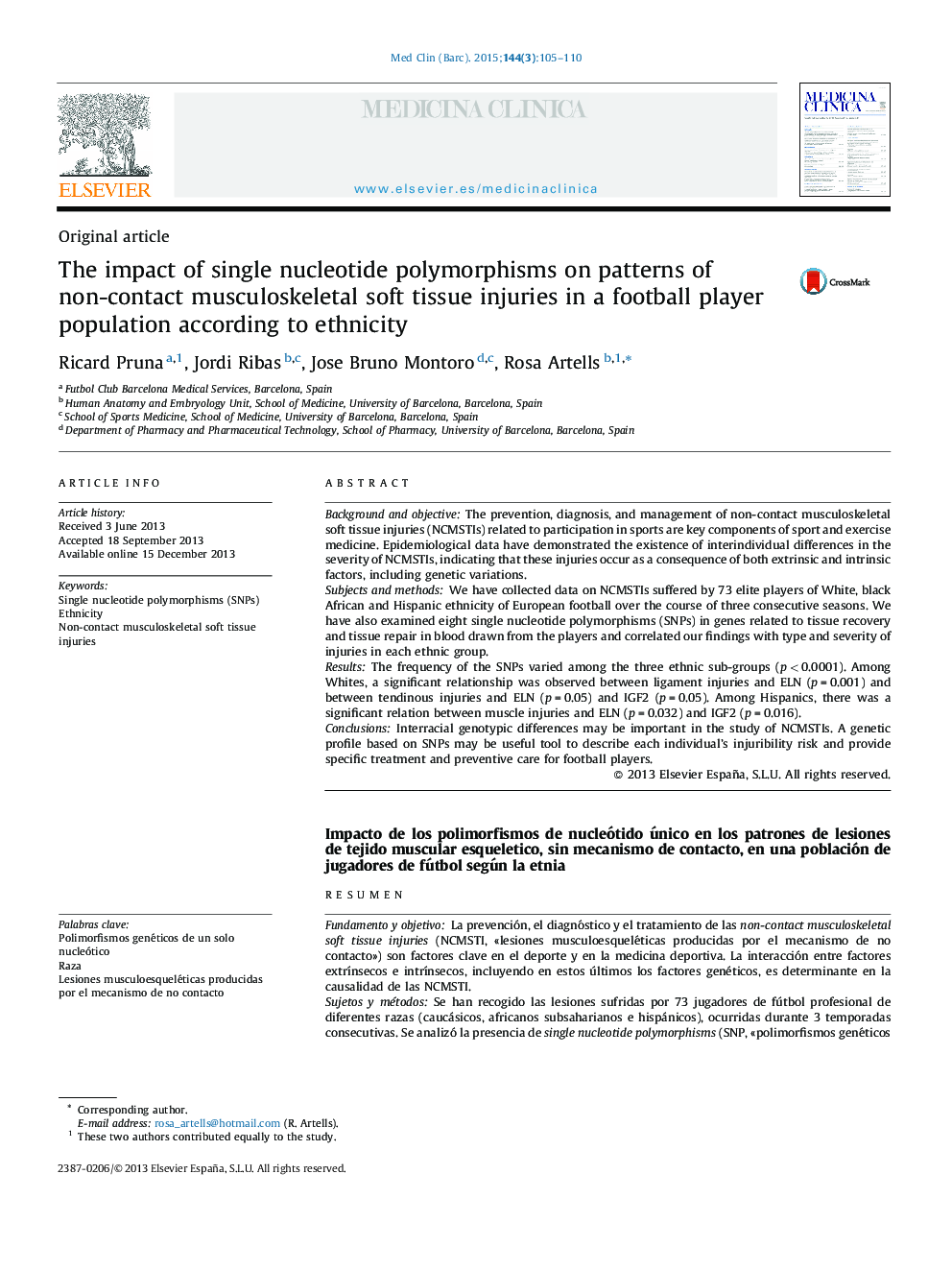| کد مقاله | کد نشریه | سال انتشار | مقاله انگلیسی | نسخه تمام متن |
|---|---|---|---|---|
| 3804440 | 1245067 | 2015 | 6 صفحه PDF | دانلود رایگان |
Background and objectiveThe prevention, diagnosis, and management of non-contact musculoskeletal soft tissue injuries (NCMSTIs) related to participation in sports are key components of sport and exercise medicine. Epidemiological data have demonstrated the existence of interindividual differences in the severity of NCMSTIs, indicating that these injuries occur as a consequence of both extrinsic and intrinsic factors, including genetic variations.Subjects and methodsWe have collected data on NCMSTIs suffered by 73 elite players of White, black African and Hispanic ethnicity of European football over the course of three consecutive seasons. We have also examined eight single nucleotide polymorphisms (SNPs) in genes related to tissue recovery and tissue repair in blood drawn from the players and correlated our findings with type and severity of injuries in each ethnic group.ResultsThe frequency of the SNPs varied among the three ethnic sub-groups (p < 0.0001). Among Whites, a significant relationship was observed between ligament injuries and ELN (p = 0.001) and between tendinous injuries and ELN (p = 0.05) and IGF2 (p = 0.05). Among Hispanics, there was a significant relation between muscle injuries and ELN (p = 0.032) and IGF2 (p = 0.016).ConclusionsInterracial genotypic differences may be important in the study of NCMSTIs. A genetic profile based on SNPs may be useful tool to describe each individual's injuribility risk and provide specific treatment and preventive care for football players.
ResumenFundamento y objetivoLa prevención, el diagnóstico y el tratamiento de las non-contact musculoskeletal soft tissue injuries (NCMSTI, «lesiones musculoesqueléticas producidas por el mecanismo de no contacto») son factores clave en el deporte y en la medicina deportiva. La interacción entre factores extrínsecos e intrínsecos, incluyendo en estos últimos los factores genéticos, es determinante en la causalidad de las NCMSTI.Sujetos y métodosSe han recogido las lesiones sufridas por 73 jugadores de fútbol profesional de diferentes razas (caucásicos, africanos subsaharianos e hispánicos), ocurridas durante 3 temporadas consecutivas. Se analizó la presencia de single nucleotide polymorphisms (SNP, «polimorfismos genéticos de un solo nucleótido») en un conjunto de genes relacionados con la reparación y la regeneración del tejido a partir de sangre obtenida de los jugadores, y se correlacionó con el tipo y grado de lesión en cada grupo racial.ResultadosLa frecuencia de aparición de los SNP varía en las 3 poblaciones estudiadas (p < 0,0001). En cuanto a la población caucásica, se observa una relación estadísticamente significativa entre lesiones ligamentosas y ELN (p = 0,001) y entre lesión tendinosa y ELN (p = 0,05) e IGF2 (p = 0,05). En cuanto a la población hispánica, existe una relación estadísticamente significativa entre la lesión muscular y ELN (p = 0,032) e IGF2 (p = 0,016).ConclusionesLas diferencias genotípicas interraciales pueden ser importantes en el estudio de las NCMSTI. Un perfil genético basado en los SNP podría ser una herramienta útil para describir el riesgo individual de un individuo a lesionarse y poder aplicar de esta manera los tratamientos preventivos adecuados.
Journal: Medicina Clínica (English Edition) - Volume 144, Issue 3, 2 February 2015, Pages 105–110
